Authentic Experience in Baška: Stone Drywall Workshop and Restoration
October 24, 2022 - Earlier this year, the Baška association Sinjali organised workshops and the restoration of a mrgar (stone drywall) on Ljubimer. They did it with the support of the Baška Municipality Tourist Board, the Baška Municipality, and the professional technical assistance of the 4 Grada Dragodid association. After the successful workshops held in spring, the efforts will continue this November.
If you are a fan of nature, cultural heritage and helping out - the Baška Municipality Tourist Board invite you to register for the stone drywall construction workshop that will be held on November 5 and 6, 2022 in Baška. Learn the principles of traditional stone drywall construction techniques, and enjoy the view of the sea and islands, far from the city noise and busy everyday life. The workshop is free for all participants and includes tools, protective gloves, a hot meal and expert guidance from a mentor from the association 4 Grada Dragodid.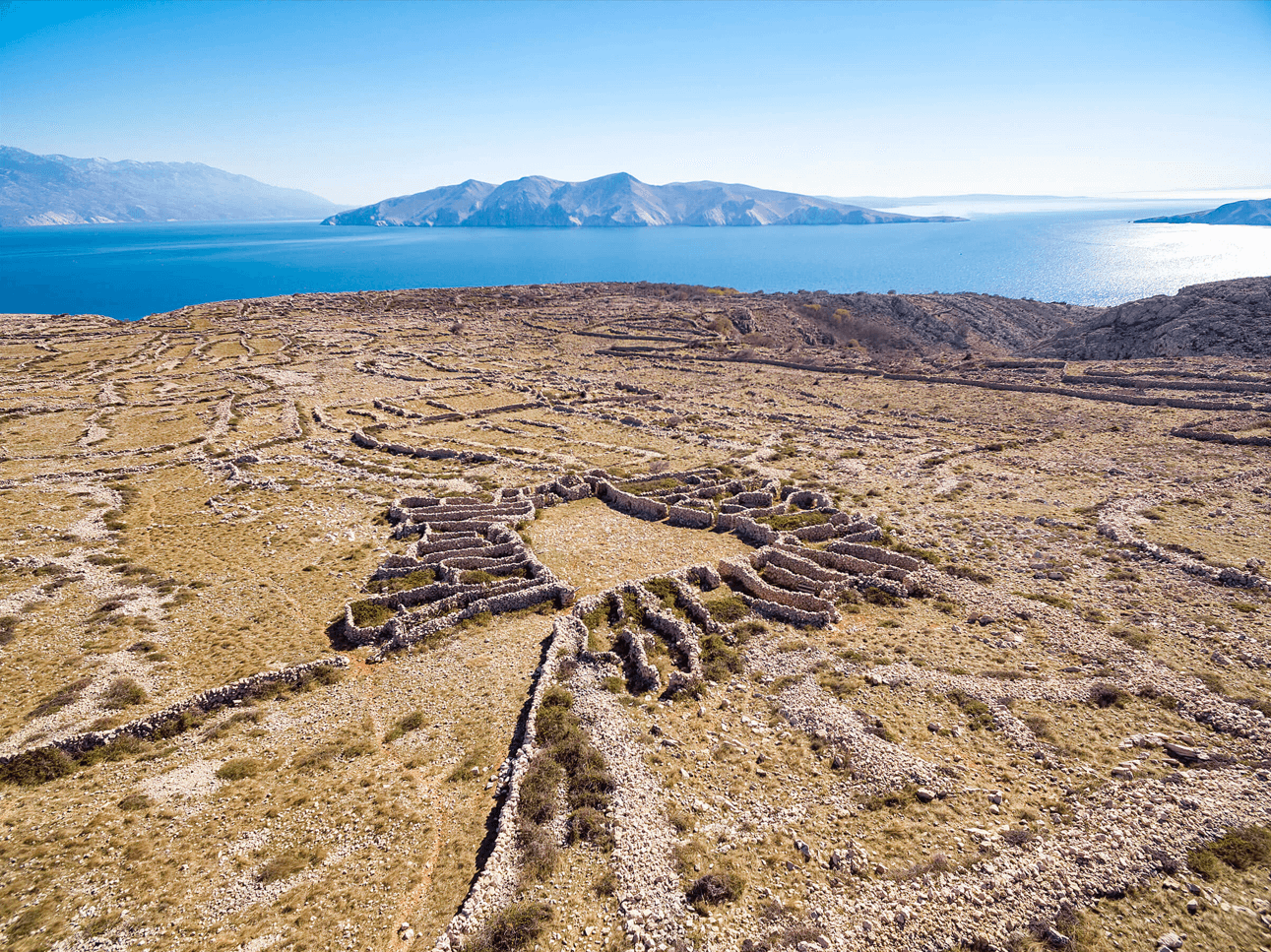
The workshop aims to restore part of the neglected mrgar, but also to encourage their further restoration and evaluation in terms of tourism, while the educational part of the programme is aimed at informing and educating the local population and visitors about the values of natural and cultural heritage and the possibilities of sustainable development that such a valuable infrastructure brings. Sign up here!
Schedule:
Saturday, November 5
08:30 - 09:00 - gathering at Zarok and distribution of tools, protective equipment and water
09:00 - departure to Ljubimer
10:00 - the start of work
15:00 - completion of works and return to Baška
16:30 - arrival in Baška
17:00 - joint dinner at Heritage Hotel Forza for all volunteers and organisers
19:30 - lectures in Zvonimir Gallery, Baška
Sunday, November 6
09:00 - departure from Zarok to Ljubimer
10.00 - 14.00 - workshop
15:30 - arrival in Baška and return of tools
16:00 - lunch at Heritage Hotel Forza and distribution of certificates of appreciation

Lectures:
1. All our mrgars - lecturer Branka Polonijo, Sinjali Association
PP presentation with photos of all mrgars, locations, functions, conservation, presentation, protection and tourism valorisation
2. Drywall construction and renovation techniques - lecturer Filip Šrajer, 4 Grada Dragodid Association
Photographs and drawings will present the most common forms of stone drywall constructions, the basic principles and the most common mistakes in stone drywall construction and the reconstruction of destroyed parts of drywalls.
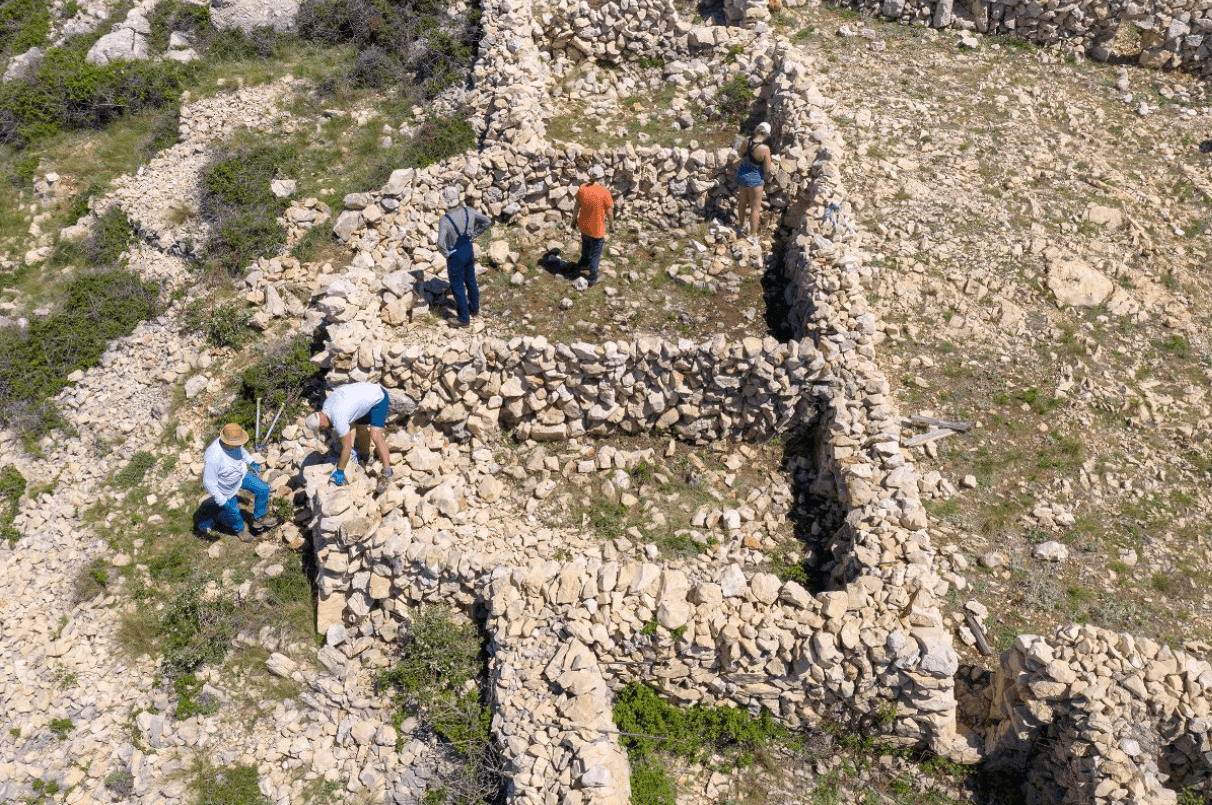
With their unique structure, which resembles a stone flower, mrgars are a recognisable decoration of the pastures (komunade) of Baška, Jurandvor and Batomalja, or at least they should be, which is the purpose of these reconstruction workshops. The speciality of these stone laces is that you can only find them on the southern part of the island of Krk. There are ten of them, five on each plateau and another five on the neighbouring island of Prvić. This way of breeding sheep was used in Wales in Great Britain, and there are two further mrgars on the uninhabited island of Dolin (near the island of Rab) and one in Switzerland!
This Krk rhapsody in stone was once created by the shepherds of Baška, Batomalj and Jurandvor, not as an artistic intervention in the landscape but as a functional object in the service of collecting and sorting sheep in the collective type of sheep farming. The mrgars consist of a common central space of the hall and, like the petals of a flower, arranged mrgarići (smaller drywalls) that the shepherds individually own.
Due to the changes in sheep farming in recent decades, the mrgars have lost their primary purpose and have been left to the test of time. However, they are part of the cultural heritage of the island of Krk and, as such, should survive for all future generations, and this is precisely the wish of the organisers of this action.
They invite all interested locals, visitors and fans of Baška to participate in a two-day workshop on stone drywall construction, an important part of the heritage of the Baška region. All help is welcome!
For more, make sure to check out our dedicated Lifestyle section.
In Vino Veritas: Mini Wine Festival in Punat on Krk in July!
July 1, 2022 - The 'In Vino Veritas' wine festival in Punat on Krk Island will be held from July 15 to 17.
A weekend to enjoy! This is how you could describe the mini wine festival that will bring winemakers from Baranja, Erdut, and Ilok to the golden island of Krk from July 15 to 17 - and will undoubtedly attract visitors to the island.
The idea of the festival "IN VINO VERITAS" was created to strengthen friendly and business relations of winemakers from the areas of Baranja, Erdut, and Ilok, with an emphasis on the municipalities of Punat and Tovarnik - and business entities, i.e., restaurants and hotels from Krk Island. In its first edition, "IN VINO VERITAS" is a unique combination of "green" and "blue" Croatia, and no less important, it is an opportunity for both hosts and guests to get to know the richness of Croatia's wine offer and to have fun.
The festival's concept was born in 2019, but for already known reasons, it did not take place in 2020 or 2021. Therefore, this year's edition is eagerly awaited. The aspiration is for the festival to be a prototype for future similar events in Punat.
From Friday, July 15 - until Sunday, July 17, 2022, in the center of this beautiful place on Krk, the finest wines will be tasted. This time, smaller, family wineries from Baranja, Erdut, and Ilok were invited, a total of 6 of them, and were provided with free accommodation and exhibition spaces, i.e., promotional pours as well as wine sales in the main local square (Trg zahvalnosti), more precisely - houses where they will exhibit and sell wines. These are Vinarija Agris, Vinarija Kovats, Vina Papak, Vina Pinkert, Vina Siber and Vina/Podrum Szabo.
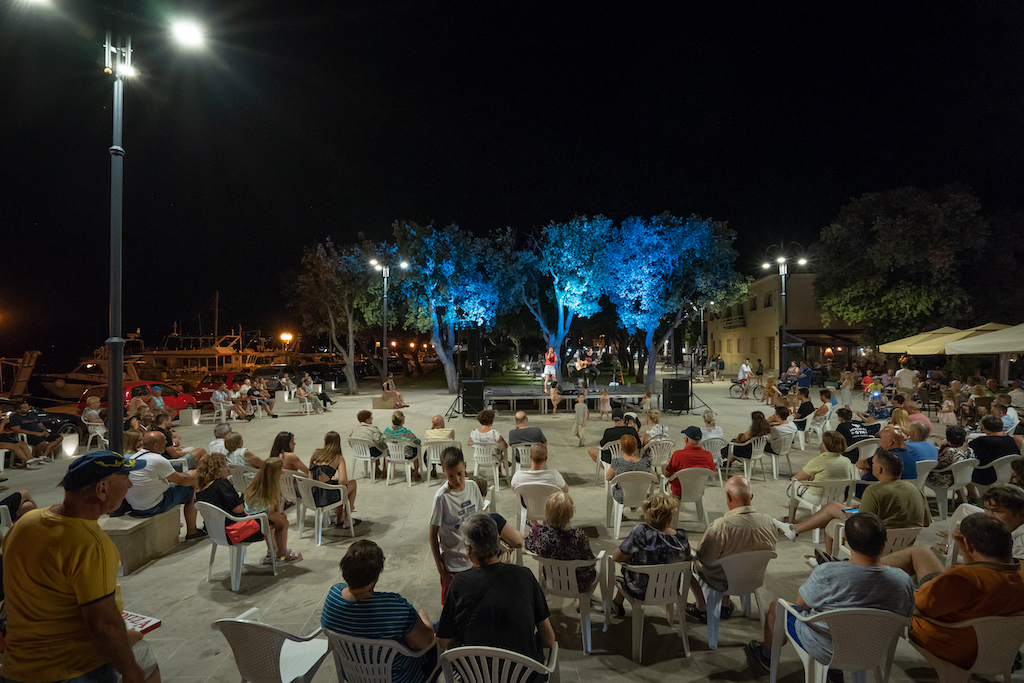
Endre Kubik from the Pinkert winery will also hold an educational workshop, "Wine terroir of Baranja," with a tasting of the best wines that this region has to offer.
The Punat Tourist Board is organizing vouchers for local and foreign visitors, along with wine tasting glasses. Visitors can buy the displayed and tasted wines directly from the winemaker.

The winemakers will also present their wines at a business dinner in the nearby BOCOON restaurant for a three-course gala dinner on Saturday evening (July 16), where local restaurateurs, media, and guests will be introduced to their wines.
PROGRAM
Friday, July 15
From 18:00 - 20:00 Trg zahvalnosti - "In vino veritas" wine festival
20:30 - Trg zahvalnosti - "In vino veritas" festival opening with the welcome of the host:
Branko Karabaić, director of TZO Punat
Sanja Muzaferija, co-organizer of the "In vino veritas" Festival
Daniela Strčić, Mayor of Punat Municipality,
from 21:00 - Trg zahvalnosti - entertainment program
Saturday, July 16
From 10 to 12 pm - Trg zahvalnosti - wine festival "In vino veritas"
12 pm - Toš Gallery, workshop: "Baranja Wine Terroir" and wine tasting, leader: Endre Kubik, PINKERT winery, Suza Baranje
From 18:00 to 22:00, Trg zahvalnosti - wine festival "In vino veritas"
20:30 - Restaurant BOCOON - dinner for guests (winemakers, restaurateurs, WOW members, media representatives, winemakers), music
21:00 - Park for entertainment program with A. Doko & V. Babin
Sunday, July 17
10 - 12 pm - Trg zahvalnosti - "In vino veritas" wine festival
For more, check out our lifestyle section.
The Island of Krk: Unmissable Destinations on Croatia's Golden Island
June 23, 2022 - While the Dalmatian islands remain the most popular among tourists, others like the island of Krk deserve your full attention and you don't even know it yet.
Let's try something. Go ahead and think of a Croatian island other than Hvar. Or Brac. Or Korčula. Or Vis. Or Pag. Or Mljet. Or Dugi Otok. Or Lopud. Or Lastovo. Remember, there are more than 1000 islands in Croatia! This is in no way a criticism. These islands are positioned better than any other and for the fairest reasons. The reputation of its beaches, nightlife, traditions, heritage, and more precedes them. The marine traffic in the Dalmatian islands is impressive, and it is understandable. However, some paradises on the northern Adriatic sea have little or nothing to envy the Dalmatian ones.
One of them is the island of Krk, located in the center of the Kvarner Bay and belongs to the Primorje-Gorski Kotar county. Krk has an area of 405.80 km2 and a population of almost 20,000 inhabitants and is the second-largest island in Croatia. Known as the ''Golden Island'', Krk is perhaps the most accessible island in the country. Why? For starters, Krk is connected by a bridge to the mainland, which allows residents and visitors to get around by car and bus very easily. In addition, Rijeka airport is located precisely on the island of Krk, so if you have booked an island accommodation and arrive by international flight, you will not have to worry much about how to get to your destination.
If the island of Krk is your choice as your next travel destination, you will enjoy a place that boasts an enormous history as it is home to the largest heritage of Glagolitic writing in the country, premium wines and olives, one of the most important pilgrimage routes in the world, Camino Krk; as well as being recognized as a health tourism destination, due to its impeccable air.
Although the island of Krk deserves to be recognized as a spectacular whole, in this article we share a little detail about the destinations that you can visit on the island.
Omišalj
Omišalj is a historic town located on the north-western part of the island of Krk and situated at 85 meters above sea level. Omišalj's privileged position seems to have attracted not only modern humans but also prehistoric inhabitants, which explains why Omišalj has existed for more than 10,000 years. Omišalj is one of the oldest towns on the island and today it is an important glagolitic and cultural center. Learn more about Omišalj HERE.
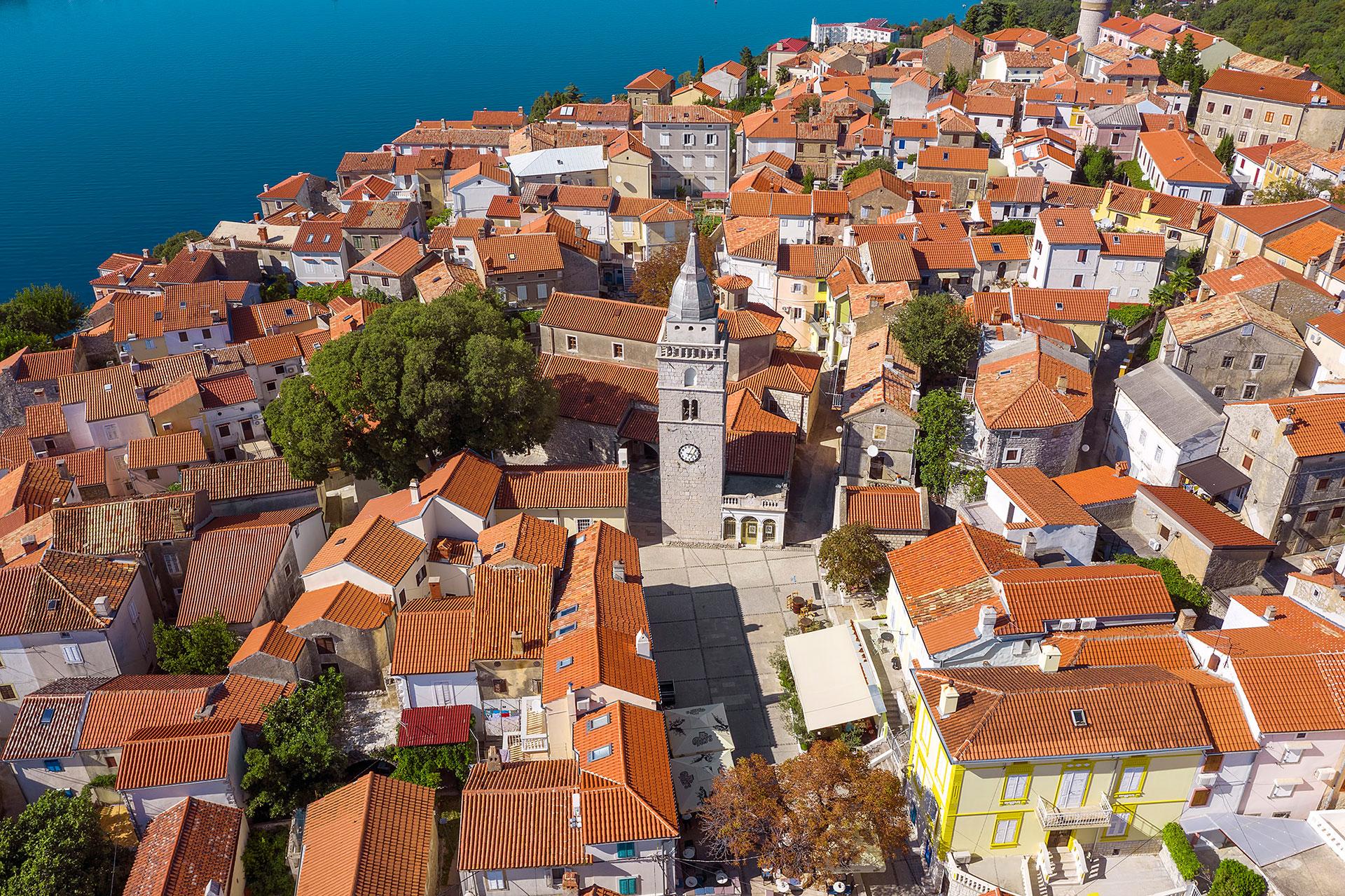
Image: Krk Island Tourist Board
Njivice
Njivice is located very close to Omišalj and belongs to the Municipality of Omišalj. Also with a rich history, Njivice has been inhabited mainly by fishermen, olive groves workers, and cattle-breeders. Njivice has always stood out for its picturesque houses along the shore and the fishermen's boats and nets, creating a typical postcard of the place. Njivice today has modern and high-quality accommodation, including hotels and camping sites. Learn more about Njivice HERE.
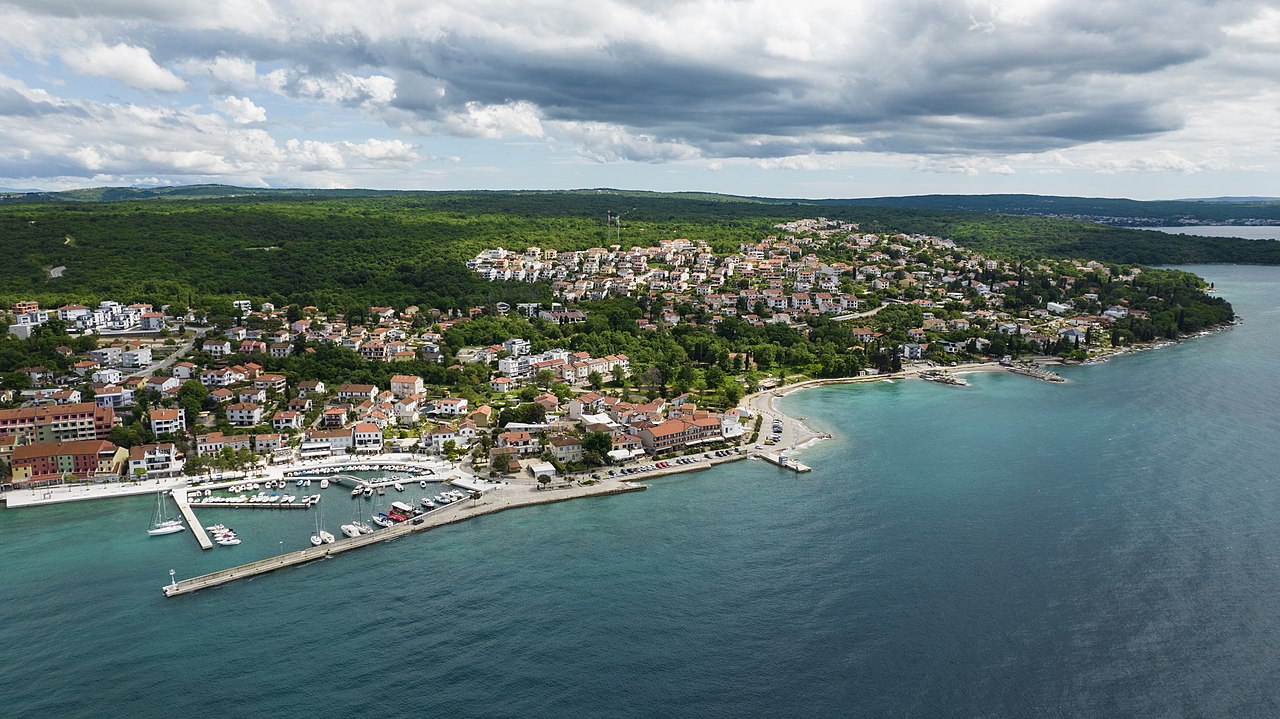
Image: Arne Müseler/Wikimedia Commons
Malinska
Malinska is one of the most popular destinations on the island of Krk, and in addition to its excellent beaches and accommodation options, it has an important marine heritage. Malinska, surrounded by forests, was once a timber export port and a favorite destination for the Viennese aristocracy. Due to its position, Malinska was also an anchor point for many ships to protect themselves from strong winds and tides. Today Malinska has a new and modern interpretation center, and the old shipyard is still operating on the same site. Learn more about Malinska HERE.
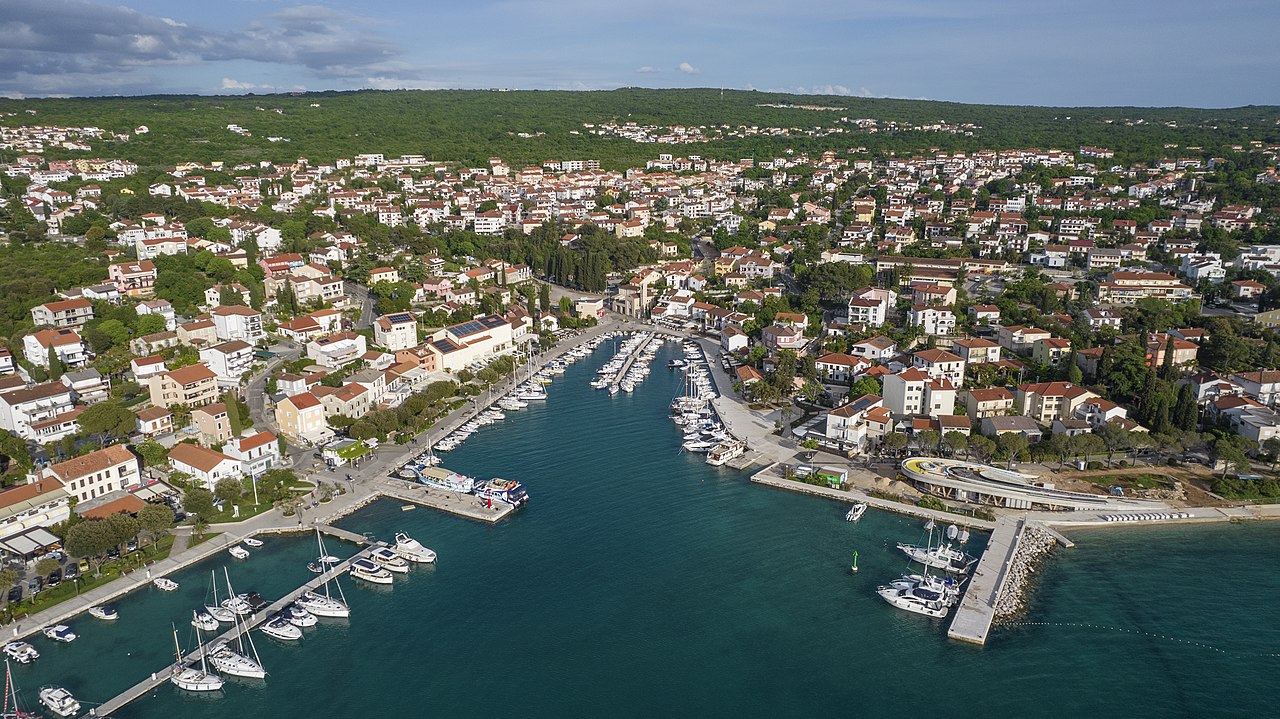
Image: Arne Müseler/Wikimedia Commons
Krk Town
The town of Krk is the administrative, political, economic, and religious center of the island of Krk. It is the town with the most inhabitants on the island, with a population of approximately 7,000 inhabitants. It is worth mentioning that the town of Krk was mentioned by the famous Greek writer Homer in a poem under the name of Koureto. Undoubtedly, the highlight of Krk is its impressive cathedral complex, built in the 5th century. Learn more about the town of Krk HERE.
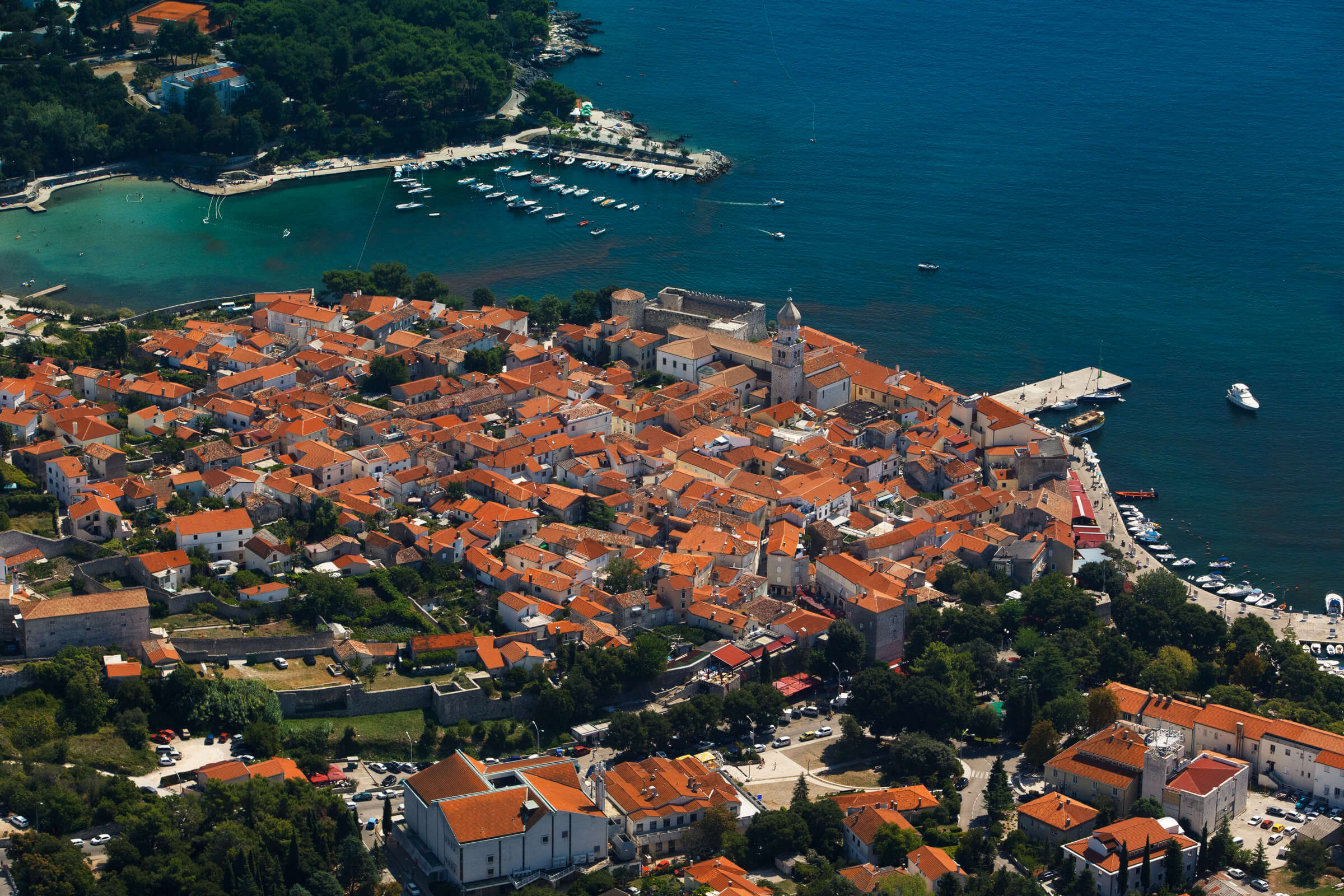
Photo: Mario Romulić
Punat
Punat is located on the east coast of the island of Krk and is considered one of its most popular destinations. Despite being considered the most recent town on the island, Punat also boasts a lot of history, culture, and heritage. There you will find not only one of the most modern nautical and marina centers in the entire country, but Punat is also the main olive-growing center on the island. When speaking of Punat, it is always necessary to refer to the small island of Košljun, where a Franciscan monastery is located. Learn more about Punat HERE.
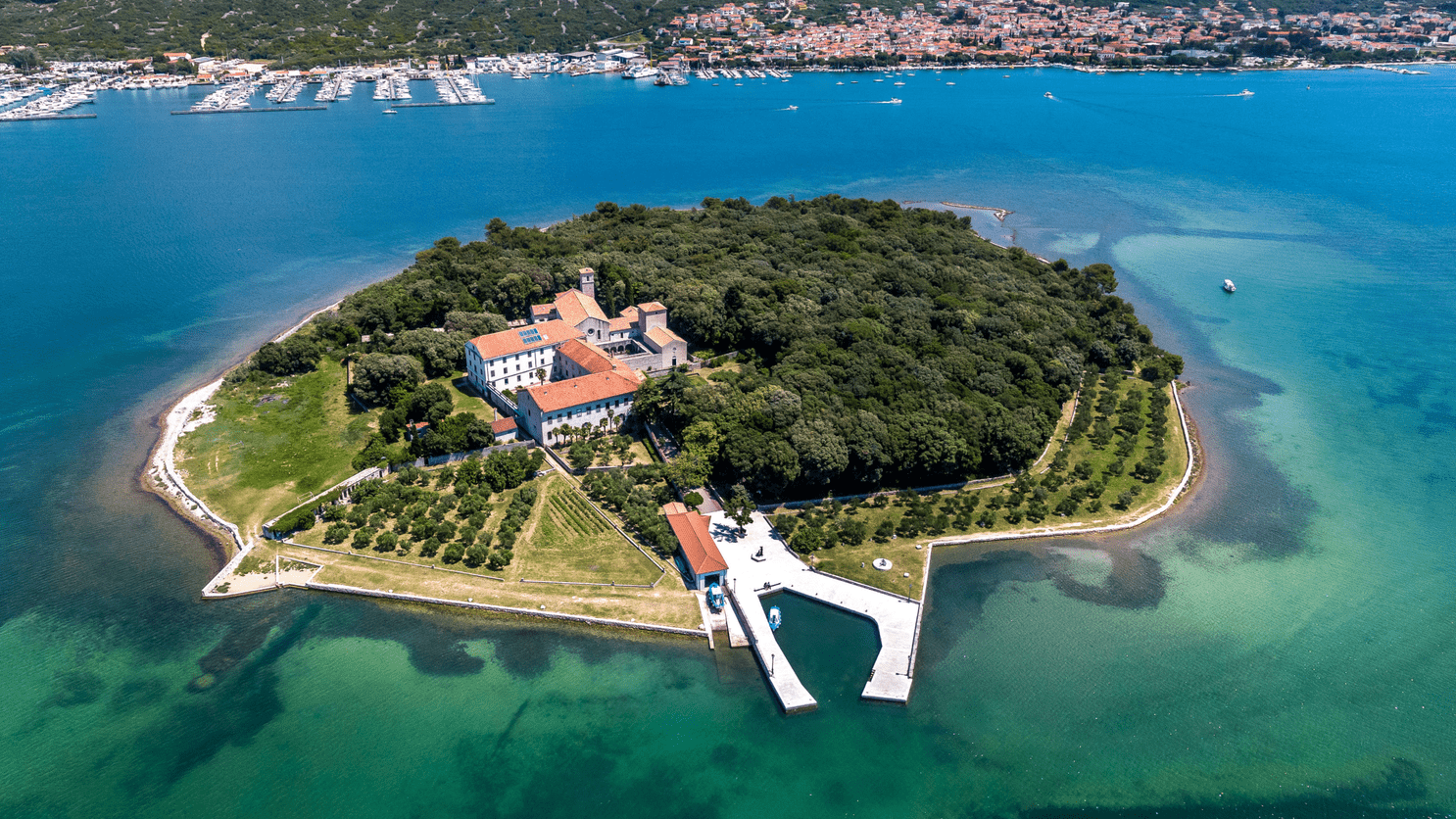
Image: Krk Island Tourist Board
Baška
Baška is located at the southern tip of the island of Krk, and is definitely one of the most prominent destinations. No matter what angle you see it from, the beauty of Baška is undeniable. In addition to its spectacular and extensive beach, Baška also stands out for the architecture in its old town, as well as its various cultural and historical monuments. Baška can boast of being a very important part of Croatian history, as it is there that the Baška tablet was found, one of the first monuments containing an inscription in the Croatian recension of the Church Slavonic language, dating from c. 1100 AD, thus being one of the most important elements of the Glagolitic script. Learn more about Baška HERE.
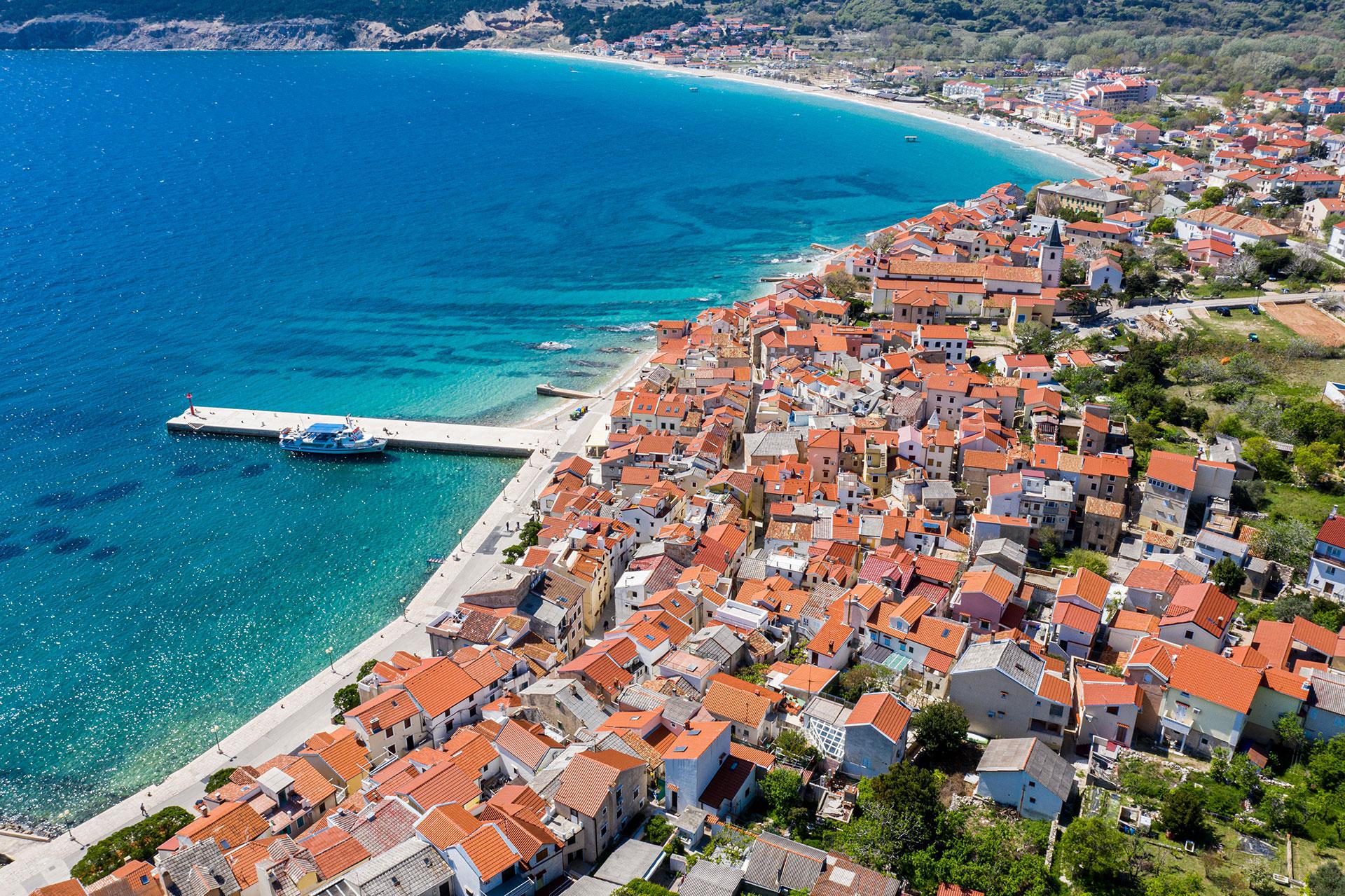
Image: Krk Island Tourist Board
Vrbnik
Vrbnik is indisputably one of the most famous settlements not only on the island of Krk but in all of Croatia. Vrbnik is well known for its Glagolitic heritage and especially for its delicious wines, and in particular is its golden-yellow wine – the Žlahtina, with a great national and international reputation. It's not the only old town on the island of Krk that sits on top of a hill, but Vrbnik sits on a large cliff by the sea, giving it a wonderful view into the distance. Learn more about Vrbnik HERE.
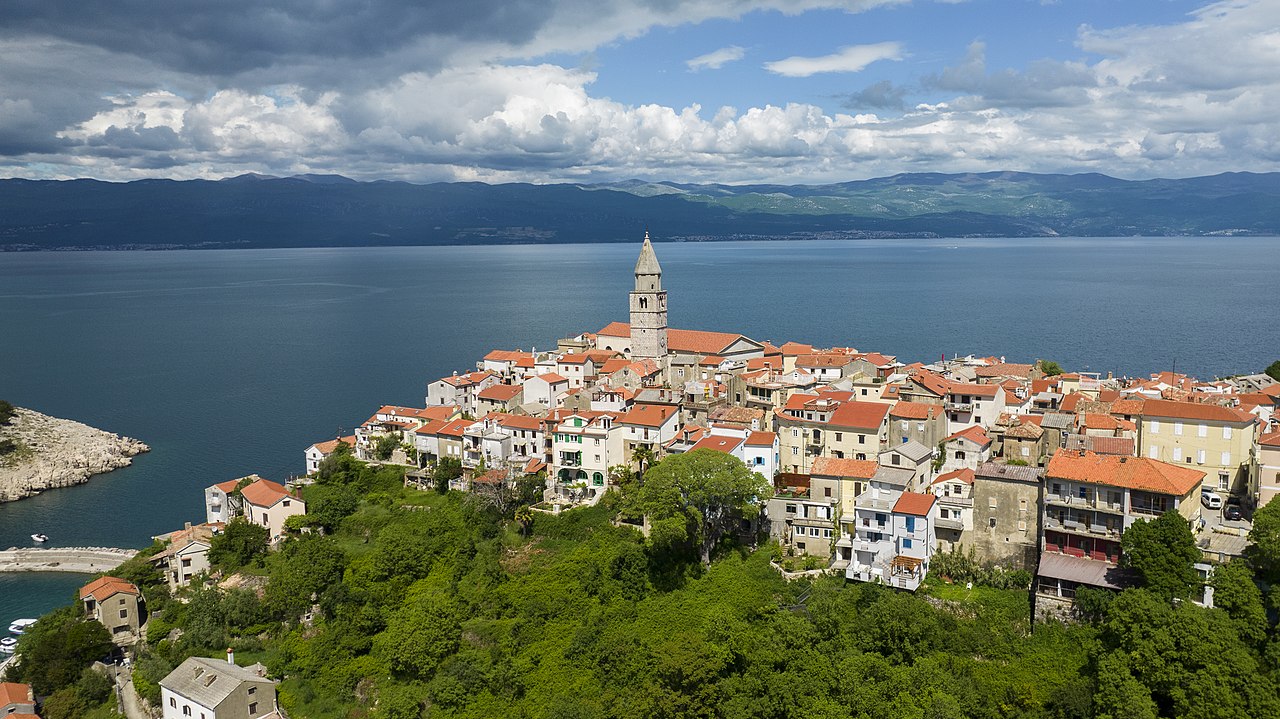
Image: Arne Müseler/Wikimedia Commons
Dobrinj
Dobrinj is located in the upper part of the island of Krk, to the east. Dobrinj includes other places of interest such as Šilo or Klimno, but surely the first thing one should do is visit the main town, which stands on a 200-meter-high hill. Dobrinj is very reminiscent of the settlements one can find in central Istria, also on hills. A beautiful destination without a doubt, surrounded by thick forests and with a great Glagolitic heritage. Likewise, many other important traditions stand out, such as its folkloric events, its typical costumes, its school of wind instruments, and its home cuisine. Learn more about Dobrinj HERE.
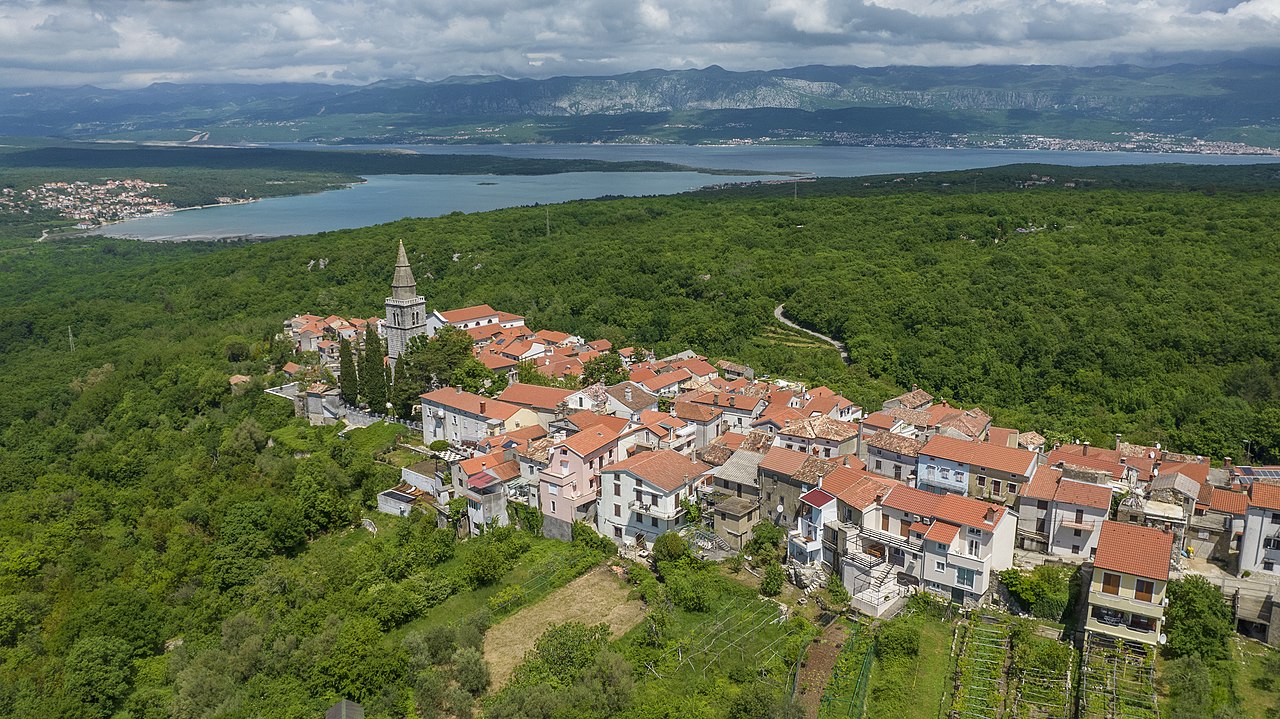
Image: Arne Müseler/Wikimedia Commons
For more on travel in Croatia, follow TCN's dedicated page.
Krk Island: Its Embark on Sustainability
June 18, 2022 - Croatia, home to many eco-enthusiasts, has made it its core aim to advocate the importance of going green and building initiatives that advise citizens to live an eco-friendly life. Now more than ever is the condition of the Earth important – as man-made climate change continues to be a focal threat to our planet. Therefore, Krk Island can be seen as a vast promoter of the reduction of greenhouse gas emissions in the Mediterranean region.
Located in the northern Adriatic Sea, at the centre of the Kvarner bay, the “Golden Island” does have a great deal to offer. By being considered one of the most attractive tourist destinations the Island’s mild Mediterranean climate and diverse nature become highly appealing to the public during the summertime. Moreover, its cultural heritage has given it the name of the “Cradle of Croatian culture” as it is abundant in all aspects of allurement.
With the introduction of the “Krk – Energy-independent and CO2-neutral Island” project, Croatia’s energy transition towards renewables continuously expands, as well as demonstrates that carbon neutrality can be profitable to other islands and the Croatian mainland. The wide installation of solar power is established to grant Krk the possibility of becoming energy self-sustainable and carbon-neutral by 2030. Thus, encouraging a positive experience for visitors and minimising the impact of tourism on the environment.
A goal for a climate-neutral Europe has been set by the future European Green Plan and the Mediterranean Strategy for Sustainable Development. According to the 10th Energy Conference of the Island of Krk, such an outcome is set to be achieved through “strengthening the economy with green technologies, creating a sustainable economy and reducing pollution”.
The project has been implemented by Eko Kvarner in cooperation with the European Asbestos Risk Association from Trieste, Italy, and Krk town. Additionally, seven of the local government units on the Island are included in the project with the objective of divulging a green economy as Croatia’s ultimate future.
Overall, it is known that buildings on the Island have been renovated in order to improve their energy efficiency and local inhabitants are permanently educated about energy-saving measures. So, do not miss the opportunity to visit Krk Island for its splendour and its progress towards sustainable development!
For more, check out our dedicated lifestyle section.
Dadathlon Festival Will Be Held on April 30th in Punat, Island of Krk!
April 13, 2022 - DaddyHood Europe has announced that the first-ever Dadathlon Festival will take place in Punat, on the island of Krk, on April 30. In its first edition, the family event seeks to connect dads and their children through sports and fun activities, and in this way raise awareness about the value of active fatherhood in the lives of children.
Almost exactly one year ago, in the town of Punat on the island of Krk, DaddyHood Europe organized the first Dadathlon race event. The strict measures to contain the coronavirus pandemic were still in force, so the event consisted of a symbolic opening ceremony that brought together 10 parents and their children, who participated in a race along the Punat promenade. Despite the cold weather and wind, the gathered families enjoyed a great day in which they could feel the exciting reward of being together with their children.
Last year's Daddyhood Dadathlon races took place in three stages:
- April 17th to 24th: Running with kids
- June 20th to 27th: Cycling with kids
- September 19th to 26th: Trekking with kids
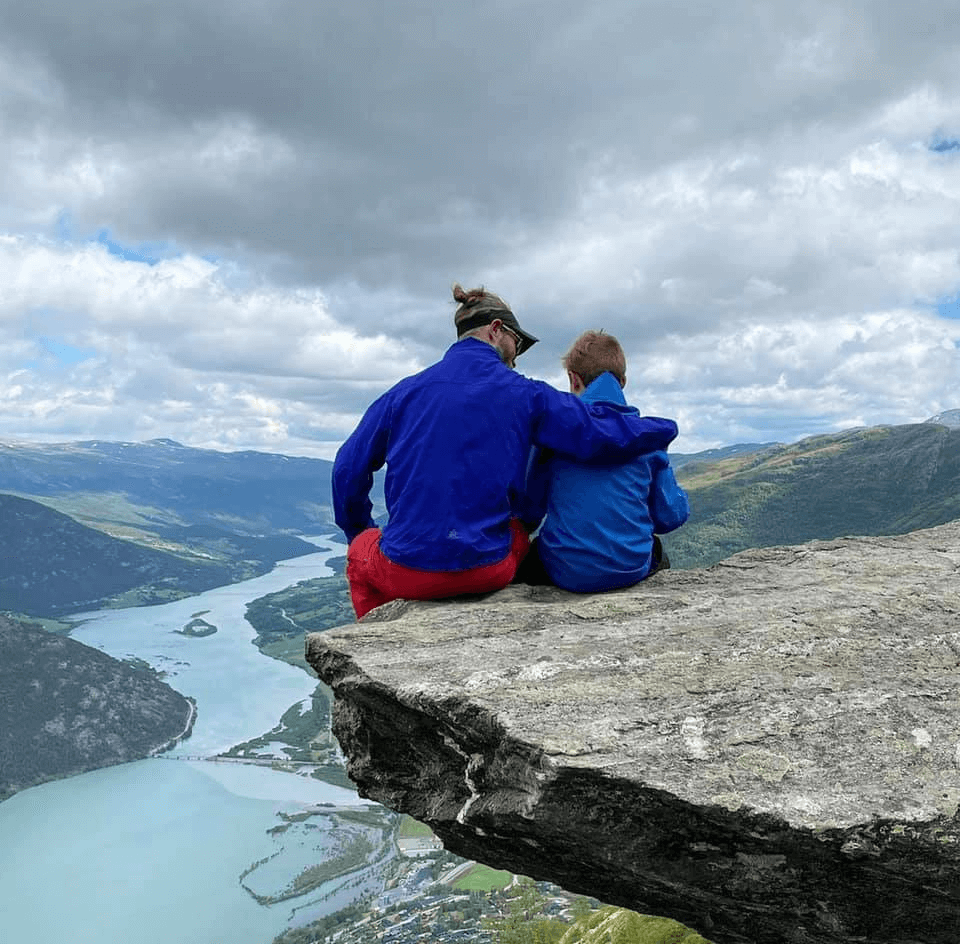
Last year, 500 dads applied for Dadathlon from 26 countries worldwide for the virtual competition.
The 2021 Daddyhood Dadathlon edition was held virtually and to allow flexibility to participants, each event was open for participation for one whole week. The races were conceived for individual teams (one father with his child/ren). It was possible to team up with other fathers and their children, to motivate each other and have even more fun, but each team member had to complete the full distance of the race. Participants were able to choose to take part in only one or two races but to complete the full Daddyhood Dadathlon, they needed to compete in all three races/disciplines.
However, it is worth noting that last year's Dadathlon festival actually took place all over the world, as 500 dads applied for Dadathlon from 26 countries worldwide for the virtual competition. Hundreds of parents shared their photos on Instagram and Facebook using the hashtag #DaddyHoodDadathlon and #DaddyHoodEurope to show off the good times they had exercising with their children during last year's competition.
TCN was at the opening of the first Dadathlon competition last year.
Now, this year, the Dadathlon festival will be celebrated in a big way and again in Punat. On this occasion, the Dadathlon Festival will feature local and diverse events for fathers, mothers, and their children in the town located southeast on the island of Krk. In addition, this year's event is approved by the EU Commission, following the successful application of Daddyhood Europe for funds from the European Union, which corroborates the exemplary organization, mission, and vision of the non-profit organization. The main event will take place on April 30 from 9:30 am in front of the Falkensteiner Hotel Park in Punat, on the island of Krk.
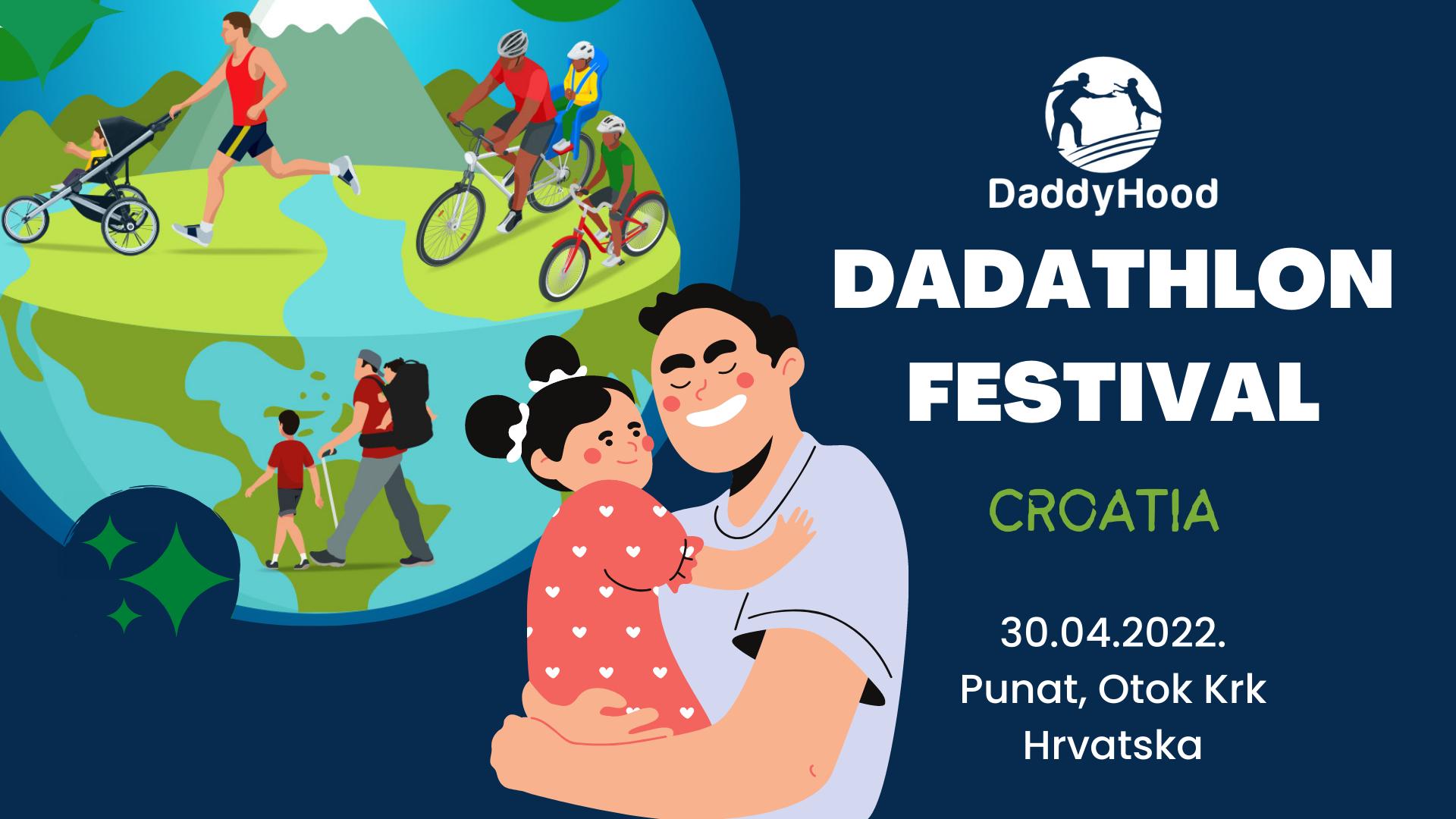
And who is behind the Dadathlon Festival? Daddyhood Europe is a nonprofit organization founded by Marino Manzoni from Croatia, and Thomas Pickelner from Sweden. Their goal is to raise awareness about the importance of active fatherhood and its role in the development of their children. According to Marino, who has organized both Dadathlon Festivals in his hometown of Punat, ''the main part of the festival is the Dadathlon RUN, a 3km race by the sea for dads and children, accompanied by many fun activities for dads, moms, and children''. The festival is held with the support of the Municipality and the Tourist Board of Punat and is co-financed by the Erasmus + program, which is why participation is completely free.
''The kids will be able to try their hand at various sports and creative activities such as archery, table tennis, athletics, football, and karate, or join robotics or music workshops. They will also have a theatrical play and an inflatable castle!'', added Marino.
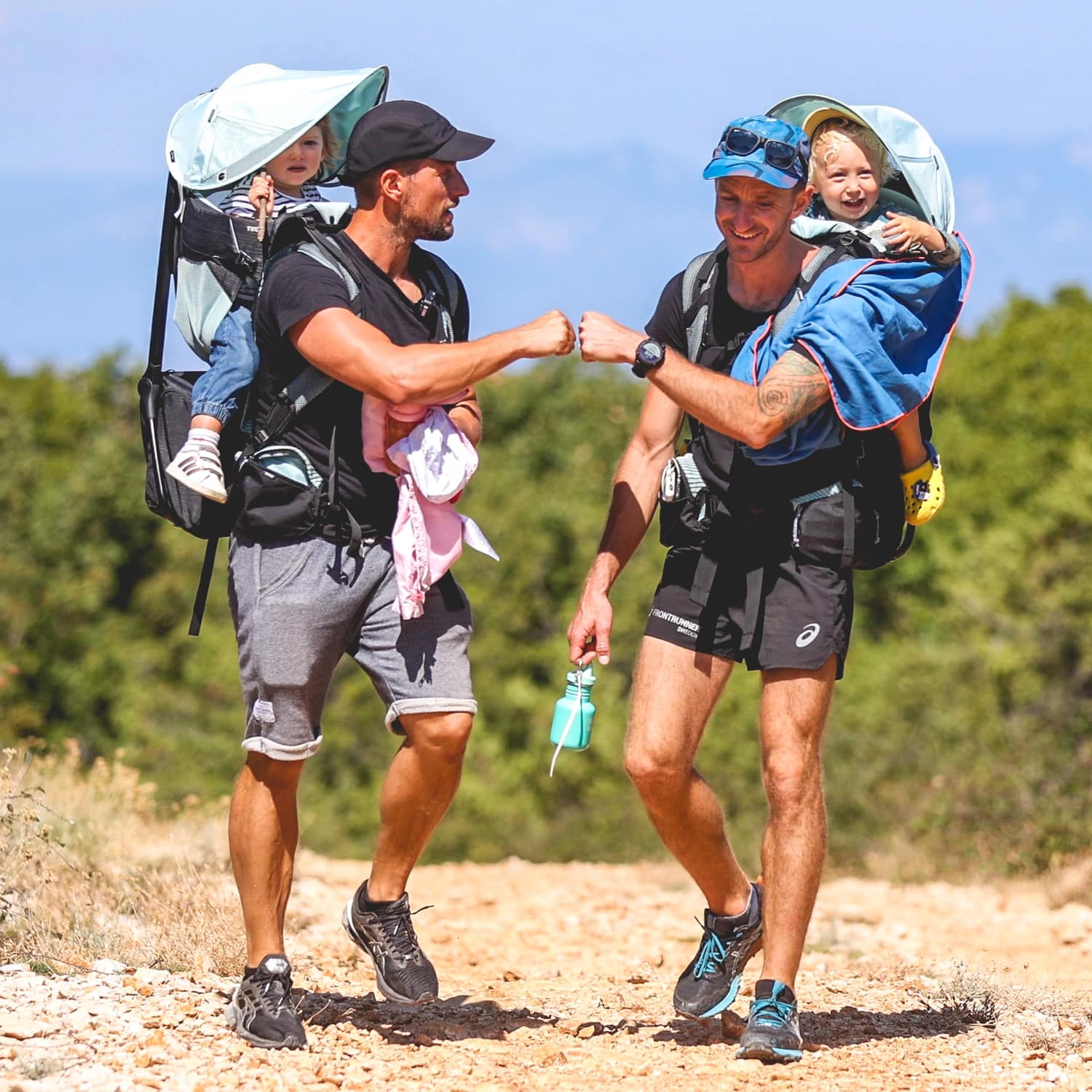
Marino Manzoni from Croatia, and Thomas Pickelner from Sweden, are the founders of DaddyHood Europe.
''And what about moms? "We haven't forgotten about moms who will be able to relax and attend fragrant salt workshops and enjoy Gin'o clock socializing and relaxing in the mom's corner''. Mom's corner, continuously throughout the day, will include:
- "Mom, how are you?" Talking about motherhood, by Nina Čikeš Stegić and Daria Mladenović.
- Presentation of the book "The Storyteller", by Martina Frka Milotić.
- Presentation of products and work of the association Women for the Island, by Jovana Čutul, Picolla Stella, and Miau couture
- Gin'o clock: socializing and relaxing with Kusshhh (Monika Kovač and Nives Matić)
- Workshop for making fragrant bath salts, with Almond natural cosmetics
- Mindfulness and breathing exercises, with Ivana Host.
In addition to the race and activities, this year's Dadathlon will feature a diverse gastronomic offer, and surely the highlight of the day will be the premiere of the documentary Daddyhood Adventure, produced by Marino and Thomas, which they recorded last year during their tour of the island of Krk with their 2-year-old children, and which seeks to raise awareness of the inevitable role of fathers in raising their children.
Daddyhood Adventure is a documentary made by DaddyHood Europe, in which Marino and Thomas explore not only the island of Krk, but also the importance of their role as parents in their children's lives.
And not only that, but this year's Dadathlon Festival also has a charitable side, and they will make boxes available for voluntary donations, which will be destined for the Krijesnica association, which provides support and help to children and families facing malicious childhood diseases.
To apply to the Dadathlon RUN race, you can register at this LINK.
To register your children in the workshops, send an email to This email address is being protected from spambots. You need JavaScript enabled to view it..
The complete program of this year's Dadathlon Festival is as follows:
09:30 - Gathering in front of the Falkensteiner Hotel Park in Punat.
10:00 - Opening of the festival and registration for the race for dads and children.
10:30 to 11:30 - Dadathlon RUN - 3km race by the sea.
12:00 to 12:30 - Telling stories for the youngest (Pčelica Nenica).
12:00 to 13:00 - Football for dads and children / Athletics (Atletski klub Krk).
14:00 to 14:45 - Archery 10-18 years (Maura Kal) / Robotics workshops 5-9 years (Stelaris).
15:00 to 15:45 - Sports workshop 4+ years (School of Sports ZVRK) / Music Workshop 4-7 years (Creative Krk).
16:00 to 16:45 - Karate 5-13 years (Karate Club Krk) / Majorettes 3-15 years (Majorettes of the island of Krk).
17:00 to 18:30 - Drama-stage workshop "Play with your body, animate your fingers" - Dad's picture book.
19:30 to 20:00 - End of the program and presentation of the film.
20:00 to 21:00 - Premiere of the documentary "Daddyhood Adventure".
Total Croatia News invites all dads from Croatia, from the Croatian diaspora, expats in Croatia, and from all over the world to participate in this year's Dadathlon Festival to spend valuable time with their children and family, have an unforgettable experience, and enjoy all that the wonderful island of Krk has to offer.
In case of additional questions, you can contact DaddyHood Europe via Facebook messenger or via email at This email address is being protected from spambots. You need JavaScript enabled to view it..
You can find more information on Dadathlon Festival's Facebook event.
For more Daddyhood Europe news and content, follow them on Facebook and Instagram.
For more about lifestyle in Croatia, visit our dedicated TCN page.
Krk Island Determined to Become Europe’s First Zero Waste Island
February 8th, 2022 - Krk island is on its way to officially join the list of some five hundred European cities and municipalities that have implemented the international Zero Waste strategy
The management of Ponikve, the main utility company on Krk island, recently met with representatives of Zelena akcija (Green Action), an organisation which is working on implementation of the zero waste strategy in Croatia.
Experts of Zelena akcija analysed the waste management system of Krk island and considered which tasks Krk has yet to fulfill in order to position and brand itself as the first zero waste island in the European Union. They discussed this with Ponikve director Neven Hržić and assistant director Ivan Jurešić, reports Novi list/Mladen Trinajstić.
Waste sorting on Krk already has a 60 percent share in overall waste management, according to Jurešić. The population of the biggest Kvarner island has no intention of stopping there, instead planning to achieve even more ambitious goals.
‘Our cooperation with the organisation [Zelena akcija] is part of the project "Transitioning to zero waste Europe, one community at a time", which, as you might remember, our utility company, or rather the island of Krk, joined last year in July when we signed the decision for Krk to adopt the international zero waste strategy’, said Jurešić.
At the meeting, the parties discussed and agreed upon further steps in the implementation of the zero waste model of maximum reduction of waste, as well as reuse and recycling.
‘The recently held meeting gave us an opportunity to go over and agree on some new, additional measures and activities that we will jointly work on in the coming years, all with the aim of meeting the demanding parameters required for the official inclusion of our island in this prestigious European ecological list’, said Jurešić for Novi list.
Among the agreed goals is a reduction of mixed waste generated by the island’s population - including tourists - from 235kg per person (2019) to 150kg per person annually. They also plan for separate waste collection to reach a 70 percent share in overall waste management.
They have also agreed on certain steps to achieve better use of biodegradable waste, and are planning to establish a so-called Centre for Reuse, a facility where prematurely discarded items will be given a new life.
In order to meet these goals, the Ponikve company will work to improve the method of separate waste collection, charge for collection based on the amount of generated mixed waste, increase home composting, open the mentioned centre for reuse, and introduce numerous models to reduce waste generated on the island, all in the coming years.
Representatives of Zelena akcija consider all the proposed measures feasible, and the agreed goals achievable. They fully expect the local self-government on Krk to meet the set criteria for a zero waste certification.
‘We are pleased with the successful cooperation with the local authorities on Krk island, as they are among the few in our country to have met the goal of separate waste collection in the share of 50 percent by the end of 2020. In cooperation with us they set even more ambitious goals and measures that will help them secure a better quality of life for the island inhabitants, but also put Krk island on the European map of the most successful local communities when it comes to sustainable waste management’, said representatives of Zelena akcija in a statement after the meeting.
'Mystery Krk Woman' Daniela Adamcova Claims She was Abducted
February 2022 - The mystery woman from Slovakia who was found bloodied and disoriented on Krk in September last year, later revealed to be Daniela Adamcova, interviewed for the Slovak weekly Terajšok in which she said that she had been abducted.
Recall, on September 12, 2021, a woman was found on a rock on the island of Krk, wholly disoriented and without any memory of who she was or where she came from. She did not have any identification. However, she spoke English, so it was immediately clear that the woman was a tourist in Croatia. Ten days later, we learned the woman was Daniela Adamcova.
Adamcova is a Slovak who spent a good part of her life in the USA. She was engaged in jewelry making and allegedly made jewelry for Hollywood stars, though this was never confirmed. She returned to Slovakia after living in America.
Now, almost five months after being found in Croatia, Adamcova is convinced that she was abducted, reports Index.hr.
Adamcova said she did not remember how she came to Croatia at all. The last she remembers is waiting for friends in the apartment to pick her up and someone ringing the doorbell. The next thing she remembers is sitting on sharp rocks in the dark covered with a blanket with traces of blood on it. After that, she says she was beaten, bloodied, and - paralyzed.
"I remembered three people. First, I remembered I was on a big boat with two men and a woman. Then I remember they dragged me to the island. Another man was waiting. He dragged me to that island. That was all I remembered. But I still see the faces of the three people in front of me. I remember them very well. I described them to the police as well," she said.
She claims that the hospital did not perform all the necessary examinations or heal her wounds. She also claims that the behavior of the police during the interrogation has changed.
"They looked at each other as if they knew what I was talking about; they suddenly lost interest in listening to me," she says.
She adds that they could not take her fingerprints because she had some kind of glue on them, and she could not scrape it off. Later, the police returned her backpack, which, she says, was full of garbage. She found only the old keys to the apartment in Trenčín. She claimed her documents, money, and everything inside had disappeared.
"I guess they thought they killed me because I was covered with a towel on that beach. It's all bizarre. Also, the fact that I had glue on all my fingers. What do you think happened?
My memory began to come back when I returned home, even Slovak. I think it must have happened here in Slovakia. Maybe it wasn’t some real company I found on the internet, but some scammers. I don't remember where I was from August 20 to September 12 and what happened in the meantime," Adamcova said.
Although she is convinced that someone injured and abducted her, she claims that she is not satisfied with the way the Croatian police acted and adds she did not contact the Slovak police.
Given all her allegations, including accusations against the Croatian police, Index asked the police to answer questions about their allegations, whether there were any indications in the investigation that it was a kidnapping and whether they checked all the information.
The police assure that they checked all the information related to the case during the investigation and that there were no indications that it was a kidnapping. Furthermore, they say that there was no indication that Daniela Adamcova was a victim of kidnapping or any other crime.
They state that they approached the whole case from the very beginning very seriously and devoted themselves entirely to checking every, even seemingly unimportant, information.
"By checking all the allegations from the statement, Rijeka criminal investigators did not establish the slightest indication that the found woman would be a victim of a crime in any way, i.e., that her disappearance and injuries were a consequence of the crime to her detriment," the Interior Ministry said.
They also state that experienced criminals worked on this case, with enviable results in their police career.
For more news in Croatia, follow TCN's dedicated page.
How Much for a Cold Drink on Krk Island? Just Give Baba a Kiss
An ancient custom on Krk island involves planting a kiss on a wet rock on the side of the road. Looking into the curious ethnological phenomenon on February 1, 2022
Many holidaymakers have discovered the charms of Baška, a picture-perfect town on Krk island. There’s plenty for this dreamy destination to boast, including a 1800m long pebble beach ideal for those who love to soak up the sun, and adventure trails for visitors who prefer an active vacation.
Visiting Baška wasn’t such a simple feat back in the day, judging by an ethnological phenomenon described by Alan Žic-Teklin of KrkDiscovered. When arriving in Baška for the first time, one was obliged to kiss a wet old woman on the way to town. No, this doesn't sound any more enticing nor any less wrong in Croatian: poljubiti mokru babu.
(Baba stands for old woman, crone or grandma, depending on the context. In this scenario, it falls somewhere between the first two, but we’ll go with the more respectful option to avoid upsetting any ancient spirits. You never know.)
Thankfully, this particular baba was simply a common nickname for stone monoliths scattered over the island. Always located in damp spots near water springs - hence the wet part of the name - the rocks were referred to as babe and the custom dictated to give them a kiss when passing by.
Where did this come from? Legend has it that St Jerome (4th century AD) was visiting the bishop of Krk and got thirsty while traversing the island. He hit a rock with his staff, causing water to spring from stone.
Since one would have to lean close to the rock and press their lips against the surface to get a drink of water, this would have resembled kissing the rock, and so the saying was born.
Legends aside, the local custom of kissing the stone baba has long been a subject of interest of historians and ethnologists. Jelka Vince-Pallua, PhD proposed a theory that the custom originates from ancient fertility cults that were practised before the monoliths, while ethnologist Nikola Bonifačić-Rožin considers that the ‘old women’ stem from an ancient superstition that the rocks will prevent the floods from washing away precious fertile soil.
The best known baba on Krk island used to be located on the side of the road at the locality Žanac near Baška. The ancient rock isn’t there anymore and has been replaced with another one, but to keep up with tradition a pipe has been installed on the location, allowing passersby to get a drink of cold water.
And the new rock that stands in place of the old monolith? It’s part of the Baška Glagolitic Alphabet Trail, a series of 35 stone sculptures displayed on a trail meandering through the Baška Valley, each bearing a different letter of the Glagolitic alphabet.
Glagolitic letters Ž and E are carved into this particular stone, standing for Žanac est! Loosely translated, it means ‘Here is the Žanac spring!’ pointing to the wealth of water resources in the area. As early as the Stone age, people inhabiting Krk island first settled in Baška Valley precisely for its many water springs.
Even though it’s not the original baba, the sculpture allows travellers in passing to respect the ancient custom and give baba a peck on the cheek if they so decide. Don’t find the prospect that enticing? You can simply mark the sculpture on your Glagolitic Trail guide - every monument has a small plaque with raised letters you can copy into the blank pages in the guide. (Copy them all as proof you visited all the locations on the trail, and you get a little gift.)
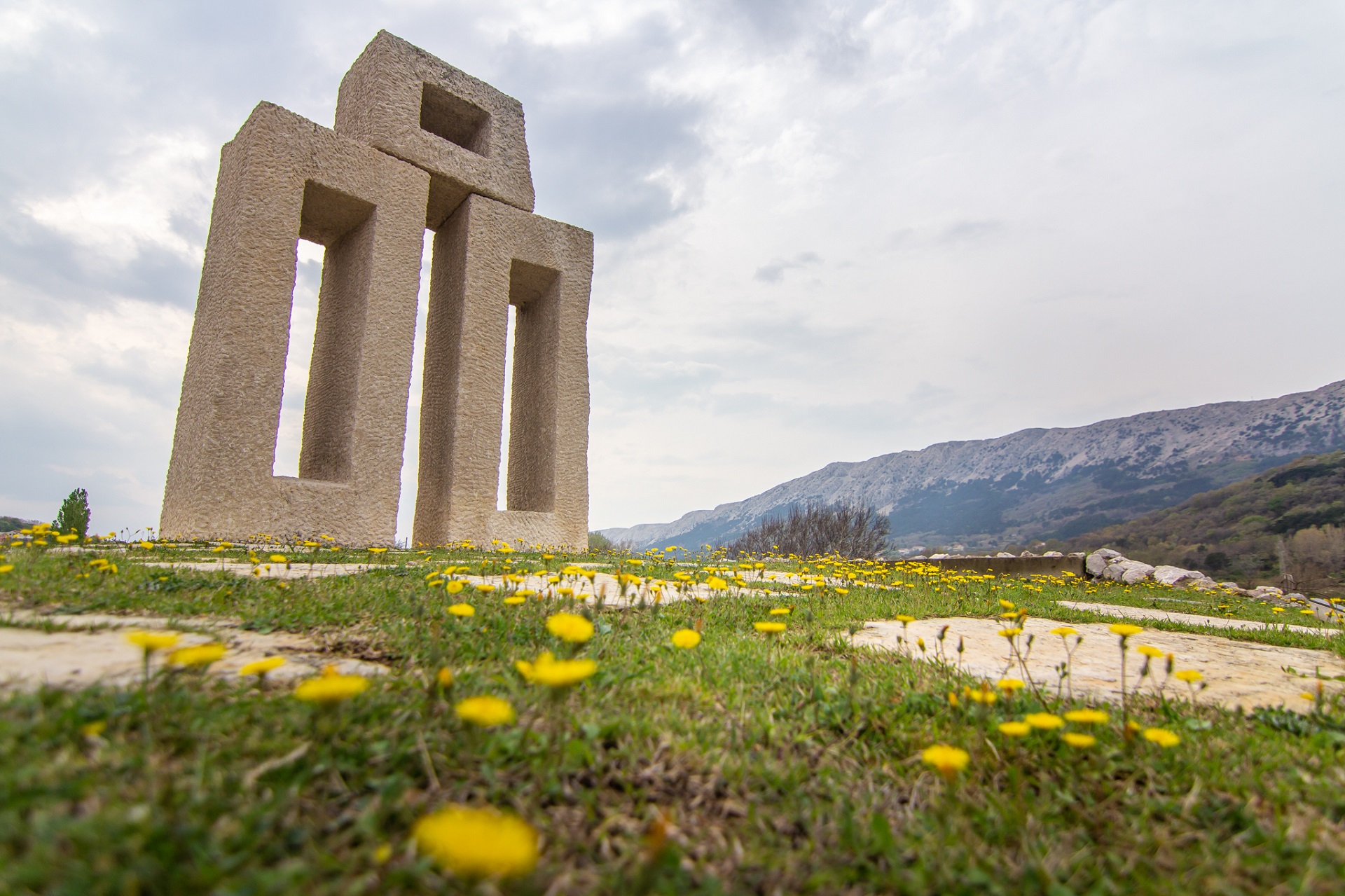
The letter L, sculpture by Ljubo de Karina / visitbaska.hr
The Glagolitic Trail project was devised by the Sinjali Association for culture, tradition and ecology from Krk. Each sculpture was sponsored by a different town; four were created by the renowned Croatian sculptor Ljubo de Karina, the rest were made by fifteen art academy students from Croatia, Slovenia, Austria and the Czech Republic.
The trail was created to highlight the rich cultural heritage of Krk island and to serve as a reminder of the importance of the Glagolitic alphabet in Croatian history. The Baška tablet in particular - perhaps the most distinguished attraction in Baška, at least where Croatian culture and history are considered.
Discovered in the church of St Lucy in Jurandvor and dating to 1100, the limestone tablet is a legal document bearing an inscription where the Croatian name (hrvatski) is mentioned in writing for the first time in history, in Glagolitic script.
You can learn more about the Baška Glagolitic Trail in this pdf guide, and follow Krk Discovered on Facebook.
Krk Outdoor Destination: Rebranding Island for Active Tourism
January 11, 2022 - Krk Outdoor - a rebranding of the island launched this year to cater to active tourism.
With the joint funds of all local governments and Krk Island tourist boards, with the support of the Ministry of Tourism and Sports and coordinated tourist board funds, a new "Krk Island outdoor brand and communication strategy" was created, reports Novi List.
Director of the Krk Tourist Board, Majda Šale, said that this is a new step forward in promoting the trump card of the island's tourist offer. The strategy was created in cooperation with the Studio Conex agency from Samobor. It was formally adopted after a recent presentation to the directors of all local tourist board offices and the Krk Island Tourist Board members.
"In addition to representatives of local self-government units and tourist boards, a significant number of external associates and partners were involved, especially those with whom the Krk Island Tourist Board cooperates in the segment of organizing and implementing outdoor projects and programs - an offer that is the focus of our new strategic document," said Šale, emphasizing that the mentioned plan is based on the concept of sustainable and balanced development of tourism on Krk, among other things through its branding and development as an outdoor destination.
This type of offer has the power to attract many new visitors in the pre and post-season. The mentioned document analyzes the current state of Krk's outdoor activities, following which strategic guidelines for building the "Krk outdoor" brand were processed and determined. Its main goal is to create a market identity and recognition of this offer. The inputs to which answers are given are diverse tourist products and the development of new products and programs harmonized with the interests and needs of modern guests, i.e., with recent trends in tourism, on an island that is easily accessible, highly developed, and environmentally sustainable, continued Šale.
The newly presented brand and the communication strategy that will promote Krk outdoor in the future will include a series of activities that will take place in phases, including education, creating a database of island outdoors, and organizing internal events. The strategy also defines ways of cooperating with local media, building websites and producing promotional materials, managing social networks, advertising, appearances at fairs, and other activities that we believe will ultimately lead to a unique island image, greater recognition of Krk as an outdoor destination and finally, to its better positioning in the emitting markets, says the head of the island's tourist board.
With the new strategic and planning steps, the island's tourism workers have kicked off the rebranded tourist offer by designing a new promotional logo.
"After fifteen years using the current Krk Tourist Board logo, we started redesigning it last year, necessary to achieve better visual recognition and adapt to new market demands. We are convinced that the new logo is a modern logo that will achieve even higher recognition of Krk Island. The newly created "book of standards" will provide a more professional approach to producing all our future promotional materials. The authorship of the new logo is designer Valter Stojšić. It consists of three colors - green, yellow, and blue, the colors of the island that symbolize nature, the color of the sun and the "golden island," and the sea.
The logo is stylized in the contours of Krk, with an inscription and typography on several language mutations according to the markets to which we will target it. The new logo will be placed on all new promotional materials, used in the official correspondence of the Krk Tourist Board, at fairs, and in all future advertising, concluded Šale, adding that its official use will begin in 2022.
For more, check out our dedicated travel section.
Camino Krk Recognized at International Sustainable Tourism Awards
December 21, 2021 - As part of this year's International Award for Sustainable Tourism (Skål International Sustainable Tourism Awards), the project Camino Krk was awarded the International Prize for Sustainable Tourism.
The Camino Krk project, in competition with ten other initiatives from different parts of the world, in the category of Rural / Rural Areas and Biodiversity (Countryside and Biodiversity), as one of the nine set categories, is positioned in third place, reports HrTurizam.hr.
This year, the evaluation of projects received in the public call was conducted by three independent judges, giving them grades that are then added up, so the initiative with the highest score wins in its category. Although Camino Krk did not win, it was highly rated, which is a great success, according to the Tourist Board of the City of Krk, adding that they will be reminded of the certificate received in recognition of commitment to sustainable practices and implementation of environmentally friendly business model.
"First of all, I must point out that all island tourist boards have made a significant contribution to the development of the Camino Krk project in terms of a new and innovative tourist product. In uncertain pandemic circumstances, after we defined the project in cooperation with the Brotherhood of St. Jacob, we decided to invest significantly in its further development. Therefore, this year Camino Krk was the focus of all tourist boards, which means that significant funds were invested in marking the entire route, involving stakeholders, creating promotional materials, and strong digital promotion," said Ivana Kovačić, director of the Tourist Board of Krk.
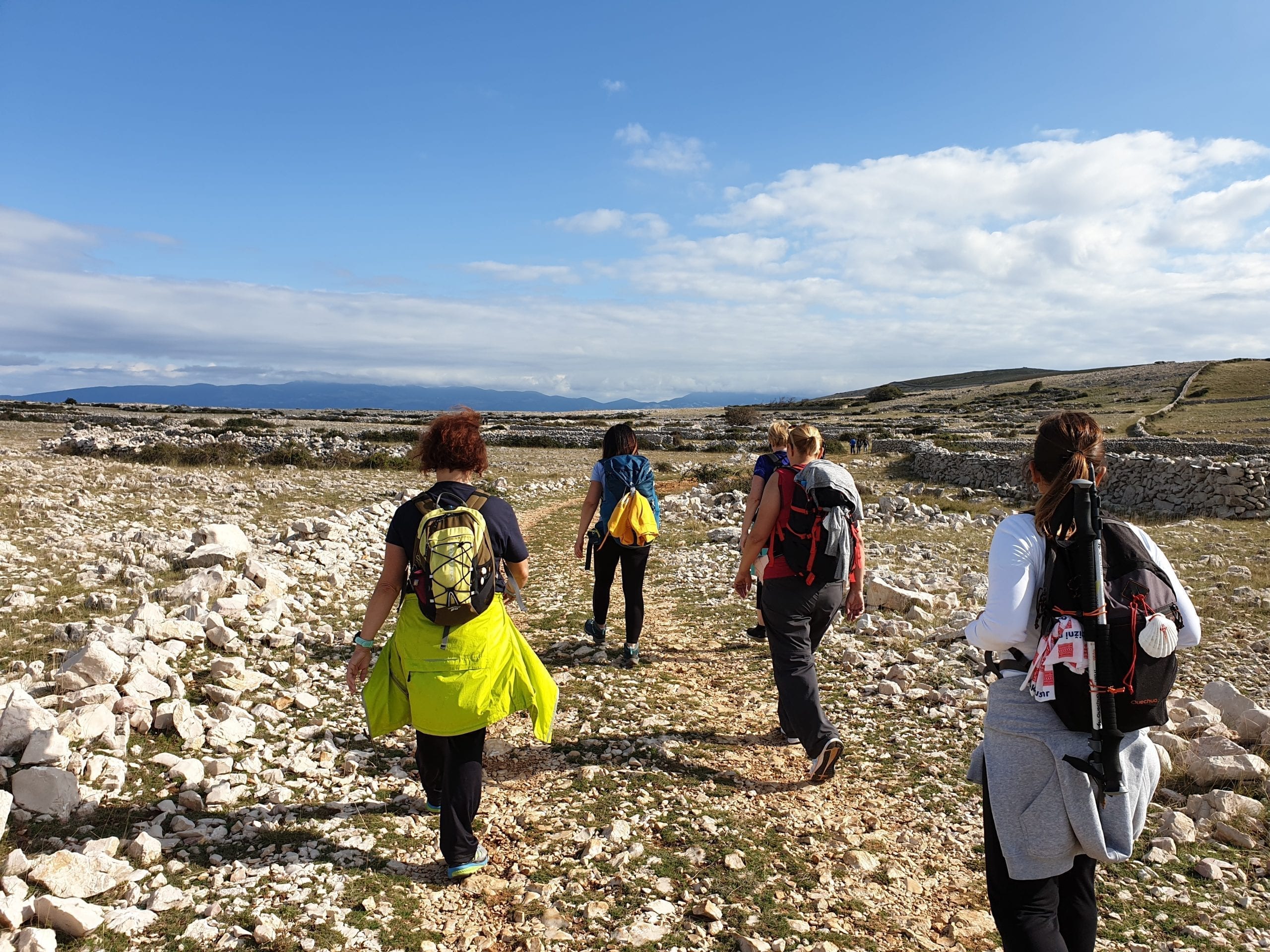
Photo: www.experiencekrk.com
The explanation of the evaluation states, among other things, that the activities related to Camino Krk have little impact on the environment and that the project itself encourages the dispersion of tourists to rural areas and the interior of the island, thus spreading economic benefits and moving away from established sun-sea concepts.
If the activities of tourists, as is the case with this project, do not adversely affect the environment, as a next step and a kind of upgrade, it is proposed that all its stakeholders, at all levels, accept the principles of sustainability in both environmental and economic terms.
"This year there was a significant interest of our guests for active holidays, staying in nature and getting to know the natural, cultural and historical heritage, and Camino Krk met their expectations by adding warmth and spiritual component to this potential-filled tourist story. In further efforts, we will certainly pay significant attention to the comments and suggestions of tourism experts received based on the application to the public call of Skål International and try to further strengthen the cooperation of all project partners," adds Kovačić.
Recall, the Camino de Santiago or the Way of St. Jacob's pilgrimage route is about 800 kilometers long and is walked by more than three hundred thousand pilgrims a year. In 1987, the Council of Europe awarded it the title of Main Street of Europe, and in 1993, UNESCO included the Spanish and French parts of the route to the Galician capital, Santiago de Compostela, on the World Heritage List. Road network of St. Jacob leading to one of the world's three leading pilgrimage centers that inherit the relics of St. James the Apostle is spread all over Europe and is most often marked with a stylized shell - James' cap, as the (primary) saint's attribute.
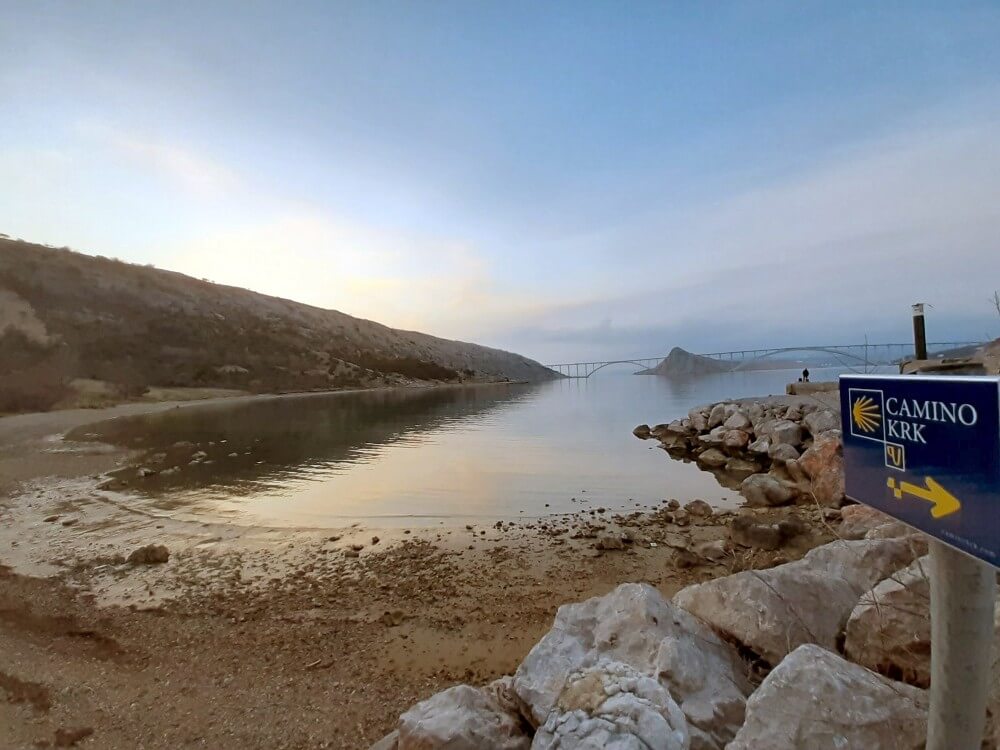
Photo: www.experiencekrk.com
The celebration of the Krk part of the Croatian Camino route took place between 2019 and 2021. Camino Krk is defined as an (all) island circular route, with a total length of more than 150 kilometers, which follows the infrastructure of existing hiking trails. Its starting point is in the island center - the town of Krk, ie the Krk Cathedral, and the final one in the village of Kornić, in the parish church dedicated to the Apostle St. James.
The tour of the Krk route is divided into seven pilgrimage chapters, more precisely seven days needed to truly experience the island's historical, cultural, and especially sacred heritage immersed in impressive natural environments and unique urban units. For easier navigation on the island of Camino, Krk is marked with recognizable, blue-yellow signs, and in addition to signalization, there is also an interactive digital map that allows tracking the route using a smartphone.
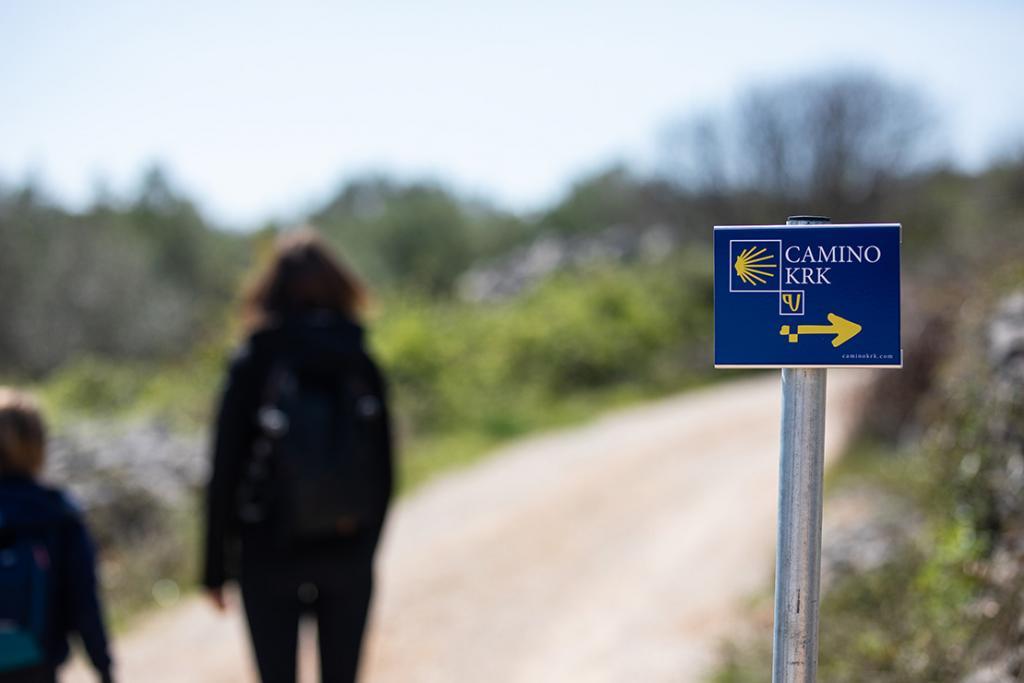
Photo: www.otok-krk.org
This project, since its launch, has attracted significant interest from both domestic and foreign pilgrims, walkers, and other recreationists, mostly Slovenes, Italians, and Austrians, which has intensified in periods affected by strict epidemiological measures.
The Skål International Sustainable Tourism Awards are presented each year to companies, institutions, agencies, and other private and public associations related to tourism.
It is a recognition that, evaluating the effects of sustainable and responsible tourism, contributes to the global visibility of applicants and registered initiatives. By entering the competition, the applicant presents its products and services to globally known experts in the tourism industry, while ensuring significant media visibility.
Skål International unites all branches of the tourism industry and operates through more than 340 clubs with almost 14,000 members in more than 100 countries, while its mission is to promote the development of responsible, sustainable, and universally accessible tourism.
For more, make sure to check out our dedicated travel section.


